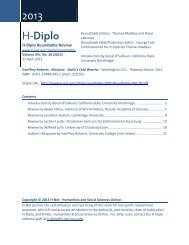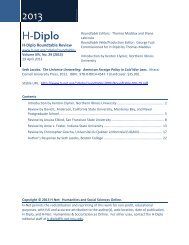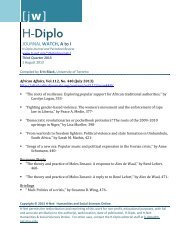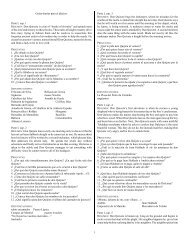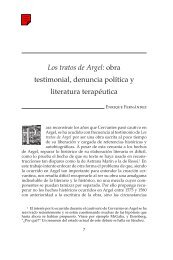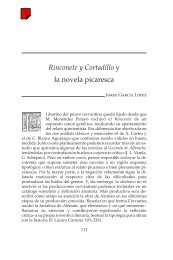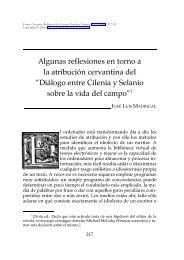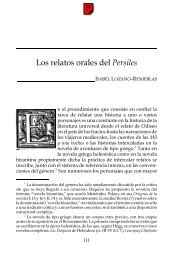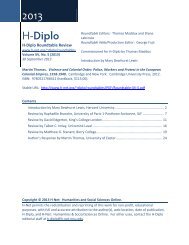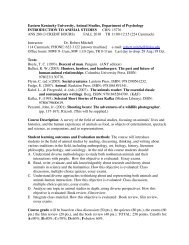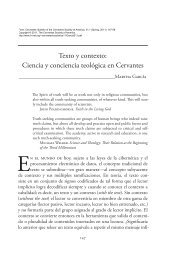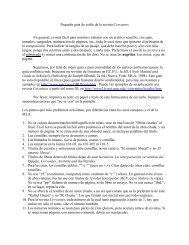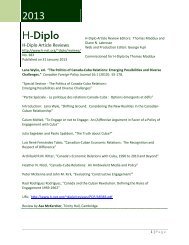The Function of Skepticism in Part I of Don Quijote - H-Net
The Function of Skepticism in Part I of Don Quijote - H-Net
The Function of Skepticism in Part I of Don Quijote - H-Net
You also want an ePaper? Increase the reach of your titles
YUMPU automatically turns print PDFs into web optimized ePapers that Google loves.
Volume 30.2 (2010) <strong>The</strong> <strong>Function</strong> <strong>of</strong> <strong>Skepticism</strong><br />
127<br />
wards authority conta<strong>in</strong>ed <strong>in</strong> the text <strong>in</strong>fluence each other, mak<strong>in</strong>g a web<br />
<strong>of</strong> relations that adds more complexity. However, those complexities<br />
must be put aside because <strong>in</strong> this <strong>in</strong>vestigation the skeptical aspects <strong>of</strong><br />
the book take precedence. This emphasis should not be taken to imply<br />
the absurdity that the literary aspects <strong>of</strong> the text are less important.<br />
To sum up, even though my analysis depends on a very limited perspective,<br />
the follow<strong>in</strong>g conclusion applies with<strong>in</strong> the parameters <strong>of</strong> the<br />
<strong>in</strong>vestigation: <strong>The</strong> strategy used by Cervantes to construct the story <strong>of</strong><br />
don <strong>Quijote</strong> is consistent with the skeptical tradition <strong>in</strong> three important<br />
ways: first, there is a deliberate effort to present the story as be<strong>in</strong>g<br />
as non-dogmatic as possible; second, the destabilization thus created is<br />
consistent with skeptical doctr<strong>in</strong>e because it forces the reader to suspend<br />
judgment about the authority <strong>of</strong> the story; third, given that the reader<br />
cannot make positive judgments <strong>of</strong> that k<strong>in</strong>d, he or she has no choice but<br />
to observe <strong>Don</strong> <strong>Quijote</strong>.<br />
Some critics, such as for example E. T. Aylward (1999) and Ruth El<br />
Saffar (1974), have expla<strong>in</strong>ed the ma<strong>in</strong> differences between the genres <strong>of</strong><br />
the Romance and the Novel. Aylward concludes that the novel “is the<br />
preferred fictional form <strong>of</strong> skeptics and doubters” (1999, 17). My analysis<br />
shows that Cervantes took the skeptical tendencies <strong>of</strong> the novel a<br />
step further: the story <strong>of</strong> <strong>Don</strong> <strong>Quijote</strong> is constructed <strong>in</strong> part by tak<strong>in</strong>g<br />
deliberate advantage <strong>of</strong> some important skeptical themes <strong>in</strong> matters <strong>of</strong><br />
argumentation.<br />
<strong>Skepticism</strong> and the Standard Objection<br />
aga<strong>in</strong>st the Romances <strong>of</strong> Chivalry<br />
If we emphasize the argumentative aspects <strong>of</strong> the text (without for that<br />
reason negat<strong>in</strong>g that the book is literature), then the function <strong>of</strong> skepticism<br />
<strong>in</strong> the story <strong>of</strong> <strong>Don</strong> <strong>Quijote</strong> can be better appreciated if we take <strong>in</strong>to<br />
account the standard objection aga<strong>in</strong>st the Romances <strong>of</strong> Chivalry. <strong>The</strong><br />
most common objection dur<strong>in</strong>g the Renaissance and the Golden Age<br />
is not only that they conta<strong>in</strong> all k<strong>in</strong>ds <strong>of</strong> falsehoods, but also that those<br />
falsehoods are harmful to one’s character. More precisely, the objection<br />
does not state that those books are false and harmful, but that they are<br />
harmful because they are false. One does not have to go far to see this



